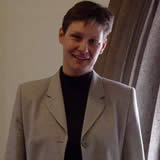

![]()
::: postdoc fellowships
::: senior fellowships
::: resident fellowships
::: associateships
![]()
being here
::: visiting
::: the last donut
::: photo album
::: center home >> people >> visiting fellows, 2002-03 >> bailer-jones |
||||
Daniela
Bailer-Jones Some of the most iconic images of our age are models of scientific phenomena—the three-dimensional multi-colored double-helix model of DNA; the solar system models representing the structure of the atom; and models of the human brain that look like wiring diagrams. Computer models of the earth’s weather systems are a regular feature of the evening news. Yet as familiar as they are, models are very puzzling. And as Dr. Daniela Bailer-Jones can attest, they don’t become less so after you have studied them intensely. But having spent a semester at the Center for Philosophy of Science doing so, she feels she has made significant progress. She is also spreading the word. Early on in her visit she organized an informal reading group looking at various philosophical discussions of scientific models attended by both faculty and graduate students. Having previously taken an M.Phil. degree in radioas-tronomy, Daniela continued in history and philosophy of science. In this subject she received a Ph.D. from Cambridge University in 1998, during which time she met and married her husband Dr. Coryn Bailer-Jones. She, Coryn, and their four-year-old son Ezra were originally scheduled to join us from University of Bonn a year earlier, but a heroic battle with cancer forced Daniela to postpone her fellowship. It is thus a very special pleasure for us to hear her infectious laugh in the halls of the Center this year. Bailer-Jones’s interest in scientific models stems from a desire to grasp their roles in helping us to understand the world around us. She sees the use of models as a particularly systematic way of capturing and describing natural phenomena. She is suspicious of philosophical accounts of scientific models that are not in contact with actual scientific practice, and thus focuses on the concrete development of models, for example by astrophysicists trying to understand radio sources. In addition to looking at published uses of such models, she also interviews scientists in order to find out what they think models are and what they use them for. Before they are publicly accessible in journals or on the Internet, Bailer-Jones reminds us, scientific models are cognitive tools, aids in helping us think about the difficult and complicated world around us. Bailer-Jones is thus also systematically investigating research in the cognitive sciences, and especially cognitive psychology, to see if it sheds light on the scientific use of models. She is especially hopeful that recent work in cognitive psychology on visual representations and on child development will have more or less direct application to her work. This has a possibly paradoxical consequence, since a quick look at that work reveals that it makes pervasive use of…models! Like all models, scientific models are often incomplete and highly idealized, i.e. offering us incomplete and stylized representations of the phenomenon that is modeled. Mathematical models, for example, can be highly abstract and idealized by comparison with the phenomena they are intended to model. Moreover, there are often known inconsistencies between two models in a single area of science. What intrigues Dr. Bailer-Jones is that, despite these apparent shortcomings, models nevertheless continue to be crucial tools in the tool kit of the working scientist. She speculates that it is not only in areas of science where there are serious gaps in our understanding that models play an important role; they allow us to think fruitfully both where we lack a coherent and detailed account of nature and where we have one. Looking ahead, she plans to study, within the context of developmental psychology, models that describe causal-mechanical relations. Certain models often seem to develop narratives about how one thing brings about another, and this seems somehow to help us understand what is going on—even when we are well aware that the events being modeled happen simultaneously! Riding a bike is a useful model! You push down the pedal, and as you do the back wheel starts moving. Nevertheless we often describe such events by telling a mechanical story—you push down the pedal, it (then) turns the cogwheel that (then) moves the chain. The chain (then) turns the axle of the back wheel of the bike that (then) starts turning. Unlike a model such as the static, three-dimensional double helix, these causal mechanical models are intended to help us better understand the causal relationships among the components of a natural system. This way of thinking is so ingrained in the modern scientific worldview that it desperately needs the critical reflections of a philosopher of science. It is a source of pride at the Center that we were able to give Daniela Bailer-Jones the time to reflect on scientific models. Her enthusiasm has proved infectious as her laugh. - JGL Fall 2003 Daniela Bailer-Jones is interested in, among other things, cognitive aspects of science and recent history of philosophy of science. Her work centers on scientific models and she is currently writing a book on the 20th century treatment of scientific models in philosophy of science. She came to Pittsburgh together with her husband Coryn, an astronomer, and her four-year-old son Ezra. Coryn is affiliated with the Department of Physics at Carnegie Mellon University and Ezra works on perfecting his American accent at The Children’s Center of Pittsburgh. Daniela received her Ph.D. from Cambridge, UK, in 1998 and has since been teaching at the Universities of Paderborn and Bonn in Germany. She has been accepted into the Emmy-Noether Program of the German Research Council with a project called “How Scientific Models Represent: Towards a Cognitive Account,” and her research visit to Pittsburgh took place under the auspices of this program. And in her spare time … she frequents the local playgrounds. 14 November 2006 |
|
|||
